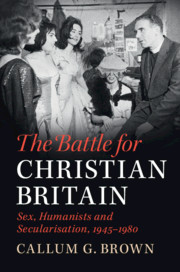Book contents
- The Battle for Christian Britain
- The Battle for Christian Britain
- Copyright page
- Contents
- Preface
- Acknowledgements
- Abbreviations
- Part I The Battle in Context
- Part II The Heyday of Christian Vigilance 1945–1965
- 2 Moral Vigilance
- 3 Licensing at the Front Line
- 4 Licensing in the Provinces
- 5 The Battle at the Beeb Part 1
- Part III The Sixties Crisis and Its Legacy 1965–1980
- Part IV Conclusion
- Bibliography
- Index
2 - Moral Vigilance
from Part II - The Heyday of Christian Vigilance 1945–1965
Published online by Cambridge University Press: 28 September 2019
- The Battle for Christian Britain
- The Battle for Christian Britain
- Copyright page
- Contents
- Preface
- Acknowledgements
- Abbreviations
- Part I The Battle in Context
- Part II The Heyday of Christian Vigilance 1945–1965
- 2 Moral Vigilance
- 3 Licensing at the Front Line
- 4 Licensing in the Provinces
- 5 The Battle at the Beeb Part 1
- Part III The Sixties Crisis and Its Legacy 1965–1980
- Part IV Conclusion
- Bibliography
- Index
Summary
The Public Morality Council (PMC), formed in 1899 by the Anglican Bishop of London, was between 1945 and 1965 the most powerful moral vigilante organisation in Britain. This chapter provides the first detailed study of its modus operandi, exploring its ecumenical governance, the role of Christian and Jewish leaders in diverting morality complaints to it for investigation and the manner of its surveillance (both overt and covert) of theatre plays, variety shows, films, radio and television programmes. The chapter explains the influential function of its long-time secretary, Methodist preacher George Tomlinson, the most important vigilante in the nation. It shows how its operations peaked in the 1950s, and reveals its sense of high influence with, on the one hand, regulators (such as the Lord Chamberlain, the British Board of Film Censors, the Home Office and London County Council) and with on the other hand industry bodies (such as theatre owners, film makers, importers and distributors). Its day-to-day operations and the intensity of its power in London and with government agencies are described.
- Type
- Chapter
- Information
- The Battle for Christian BritainSex, Humanists and Secularisation, 1945–1980, pp. 31 - 62Publisher: Cambridge University PressPrint publication year: 2019

